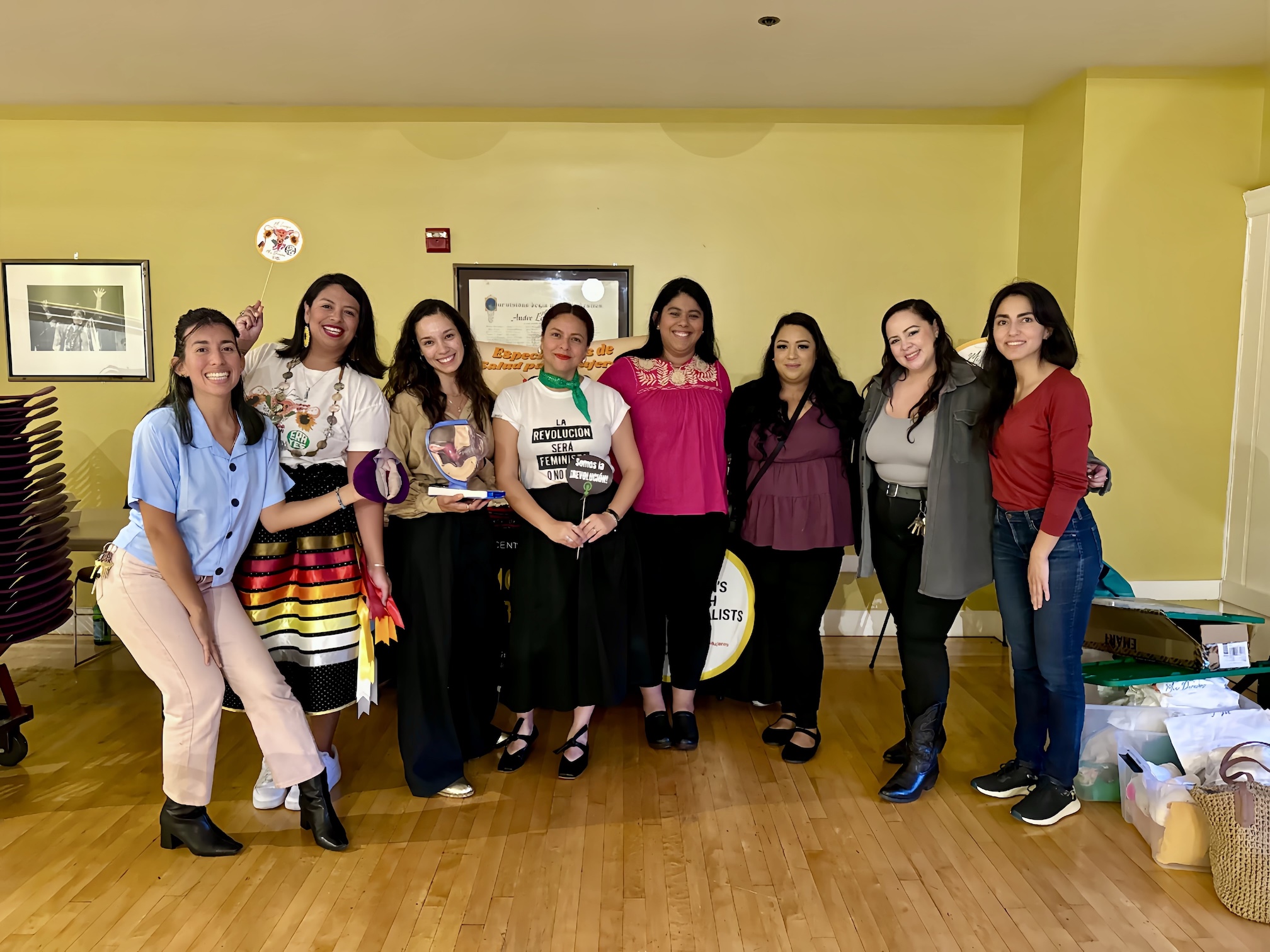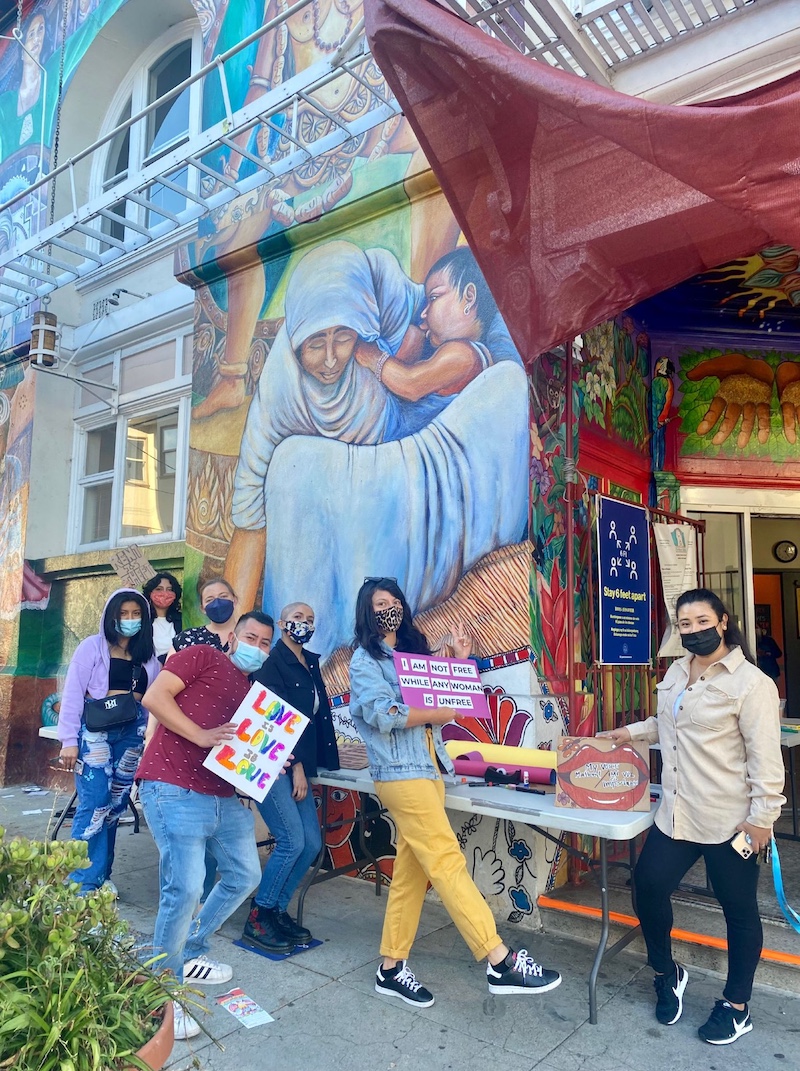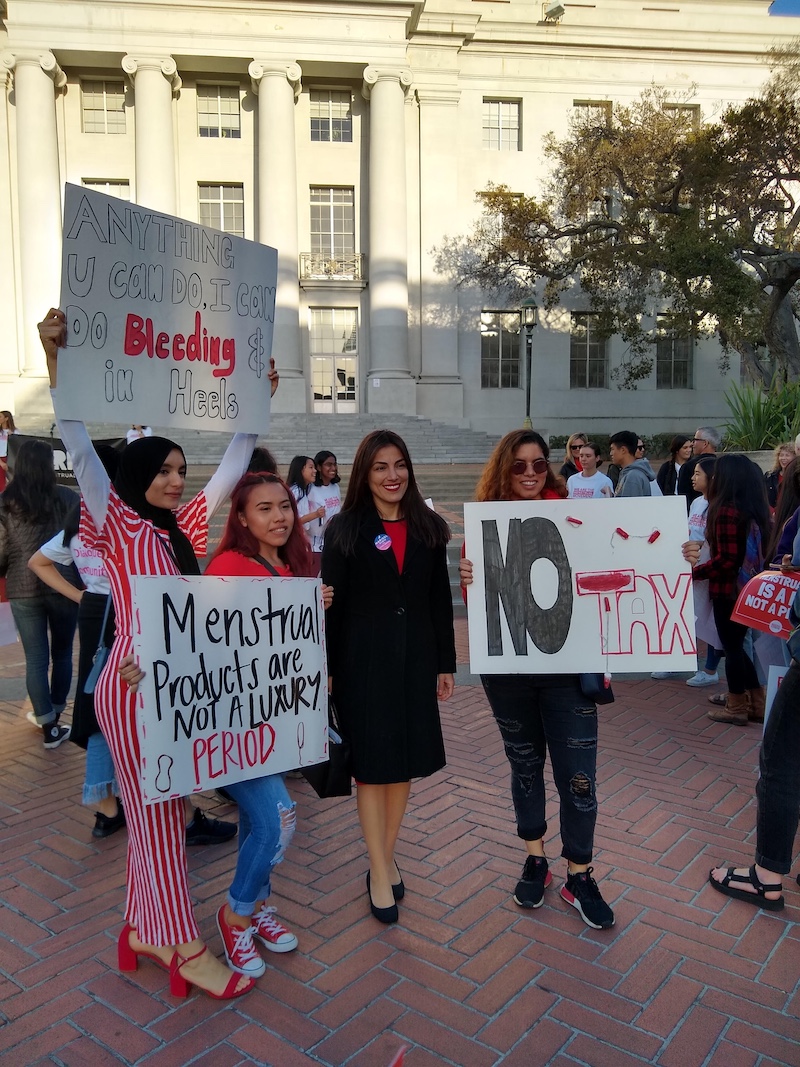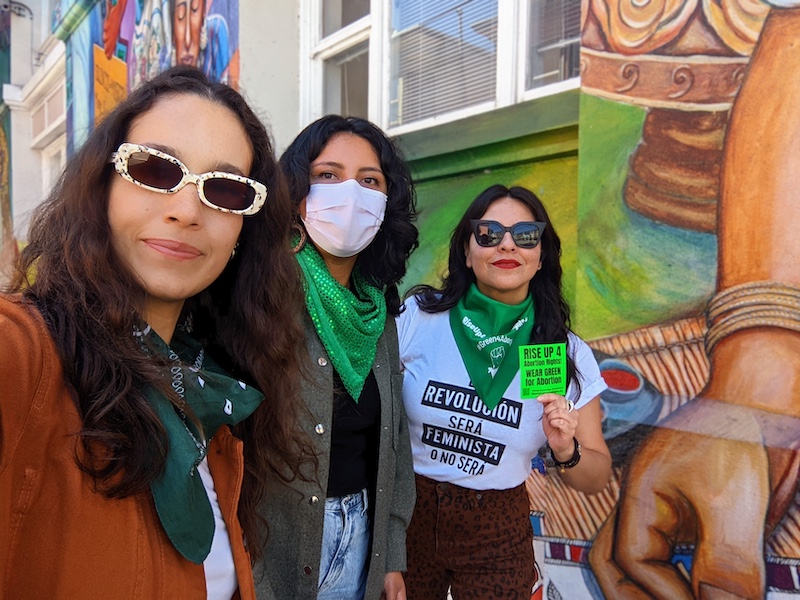Advocacy &
Community Engagement
As a historical women-led and community-driven space The Women’s Building is on a mission to provide resources for women to recognize their collective and self-determination.



The Women’s Building has integrated advocacy and community engagement efforts into our programs to ensure that not only are we providing essential services, but also advocating for the advancement and the wellbeing of women through internal and external education, community events, and key coalitions and partnerships.
As an organization guided by feminist values and principles we recognize that we must take an intersectional approach to combating systems of oppression by addressing the multifaceted barriers that women face in accessing safe spaces and essential services. These barriers include immigration status, language proficiency, unfamiliarity with available resources, and geographic proximity.
To challenge these systemic barriers, our organization employs a comprehensive community engagement strategy that focuses on increasing access to resources, education, and information about their rights as women and immigrants. We concentrate on four key areas: gender, sexuality, race, and immigration status, using an intersectional feminist approach and a social justice framework; based on the following approach and strategies:

We adopt an intersectional feminist framework to understand and address the overlapping systems of oppression that affect women, particularly immigrant women. This approach ensures that our programs and services are inclusive and consider the diverse experiences and identities of our community members.
We provide comprehensive, individualized services to women facing barriers to accessing traditional services. These services include financial coaching, job search support, housing application assistance, legal clinics, tech assistance, and a vital food pantry. Our culturally and linguistically competent staff, proficient in both Spanish and English, upholds language justice principles to eliminate language barriers and celebrate diverse communities.
Our organization engages in educational activities and workshops to raise awareness about the rights of women and immigrants. We organize community events that provide information on gender, sexuality, race, and immigration status. These initiatives empower individuals with knowledge and tools to advocate for themselves and their communities.
We actively participate in advocacy efforts and community representation on pressing issues. By collaborating with other organizations, we influence public policies that promote gender and racial equity, and immigrant rights. Our advocacy work includes lobbying for legislative changes, participating in coalitions, and organizing community forums.
We create and maintain safe spaces where women can connect, share experiences, and access resources. Our community spaces are designed to foster a sense of belonging and support, providing a foundation for women to build dignified, safe, and joyful lives.
Recognizing the economic vulnerabilities of immigrant women, we focus on initiatives that enhance their economic stability. This includes job training programs, entrepreneurship support, and financial literacy workshops. By empowering women economically, we help them gain independence and resilience against systemic oppression.
Advocacy Focus Areas
At The Women's Building, we work collectively to ensure staff, immigrant women and their families, and our broader community can access education and resources needed to advocate for systemic change toward a more just society. Our approach centers on the interconnection of gender justice and immigrant rights through meaningful policy work, accessible information sharing, community gatherings, and strategic partnerships. By leveraging our collective strengths, building on our history of intersectional advocacy, and fostering care and solidarity, we aim to create an inclusive, supportive, and empowering environment for all.
Gender Justice
The Women's Building stands firm in the conviction that people of all genders deserve to live with dignity, bodily autonomy, and freedom from gender-based violence and discrimination. Intersectional feminism guides our work to dismantle oppressive structures—recognizing that race, ethnicity, class, age, marital status, sexuality, gender identity, disability, and many other factors shape lived experiences and access to rights. We advocate for equal pay, reproductive justice, educational access, political representation, and the elimination of gender-based violence.
Immigrant Rights
The Women's Building upholds the principle that people who migrate deserve to live without fear and oppression, with full access to resources and services regardless of immigration status. We actively advocate for immigrant rights by organizing, educating and defending immigrants and refugees so they can fully participate in democracy and exercise their human rights. We believe in building collective power among individuals, institutions, and organizations to transform public discourse and create policies that advance human, civil, and labor rights for everyone.
Housing
San Francisco's extreme housing costs have forced low-income families, artists, seniors, activists, teachers, social workers, and emergency responders to endure overcrowded living conditions, take on multiple jobs, cut essential expenses, or relocate to distant areas with exhausting commutes.
The housing crisis is fundamentally a feminist issue. Women—especially those from marginalized communities—face structural barriers to safe, affordable housing. Wage inequality, housing discrimination, domestic violence, and caregiving responsibilities create additional obstacles to securing stable homes.
By actively participating in anti-displacement activism and affordable housing advocacy, we stand in solidarity with these essential community members who wish to remain in San Francisco, ensuring their voices and creativity continue to strengthen our city's feminist and progressive movements.
Partnerships and Coalitions
Menstrualiadas
A non-profit organization that is committed to raising visibility and destigmatize the menstrual cycle, menarche, and menopause.
Women’s March SF
A national movement to unify and empower everyone who stands for human rights, civil liberties, and social justice for all.
Food4All Coalition
A state-wide coalition fighting for all Californians to have access to food assistance regardless of age or immigration status.
End Period Poverty Coalition
A California-based coalition on a mission to end period poverty in California.
SFLPEC
A city-wide coalition of more than 22 Latinx-led and Latinx serving community-agencies advocating for representation and resources to ensure the Latinx community has the resources they need to reach their full potential.
California Hunger Action Coalition
A group of individuals and organizations working together to end hunger in California.
California Coalition for Reproductive Freedom
A statewide coalition of more than 40 organizations working to promote sexual and reproductive health, rights and justice.
Department on the Status of Women
Promoting equitable treatment and fostering the advancement of women and girls throughout San Francisco through policies, legislation, and programs.
Plaza 16 Coalition
A coalition made up of residents, businesses, and community organizations from the 16th and Mission neighborhood and Mission District. We believe in equitable development that creates healthy, vibrant communities of opportunity. We believe this requires thoughtful, intentional, and community-based strategies to ensure that low-income communities and communities of color participate in and benefit from the decisions that shape our neighborhoods and transit-oriented development.
FAACTS
Working to connect the food systems of San Francisco and, informed by our values, build a unified approach that inclusively meets the food needs of our neighbors. Our mission is to build a just, sustainable, and holistic food system, ensuring we are neighborhood-based and coordinated across every district in San Francisco, with the goal of nourishing our community in a way that is sincere, healthy, empowering, specific, culturally relevant, humble, and abundant.
Alliance for Girls
The largest regional alliance of girl-serving organizations and leaders in the country. Our membership includes 100+ organizations that employ 2,400 people with more than 5,100 volunteers, serving more than 300,000 girls across nine Bay Area counties.
Advocacy Terms
At The Women’s Building, we believe that knowledge is power—and shared language is essential for effective community organizing and advocacy. As we work to advance gender justice, immigrant rights, and intersectional equity, we recognize that not everyone arrives with the same vocabulary or access to academic frameworks. This glossary helps demystify key terms used in our work, offering a foundation for deeper understanding, collaboration, and action.
Our commitment to education, inclusion, and empowerment means making language accessible—so that all individuals, regardless of background, can meaningfully participate in conversations that shape our collective future.
Glossary
The right of individuals to make decisions about their own bodies, lives, and futures—free from coercion, with full access to the resources and support needed to exercise that control.
The essential, often undervalued labor that sustains individuals and families—ranging from childcare and elder care to household management and emotional labor. Care work is shaped by systems of gender, race, class, and immigration, and is disproportionately carried out by women, especially women of color and immigrant workers.
A clear, enthusiastic, ongoing agreement between participants to engage in a specific activity—especially in sexual contexts. Consent must be informed, freely given, and can be withdrawn at any time.
When members of a dominant culture adopt elements of a marginalized culture in ways that strip them of their meaning, reinforce stereotypes, or fail to acknowledge their origins and significance.
An approach that recognizes people have different needs and challenges, and therefore require tailored support. Unlike equality, which treats everyone the same, equity seeks fair outcomes by addressing systemic barriers and inequalities.
The advocacy of social, political, and economic equality for all genders. Feminism challenges patriarchal systems and works toward justice through research, education, activism, and policy change.
An ethical framework that centers justice, care, and equity—particularly in addressing gender-based injustices. It asks us to consider whether our actions reduce harm and advance fairness for marginalized communities.
A social construct that defines roles, behaviors, and expectations based on perceptions of masculinity and femininity. Gender is distinct from biological sex and exists on a spectrum.
A system that classifies gender strictly as male or female, limiting the expression of gender and reinforcing rigid societal roles.
The process of addressing and correcting systemic gender-based disparities to ensure fair access to opportunities, resources, and rights for all genders.
The measurable differences in behaviors, attitudes, and outcomes between genders—such as how women and men vote, work, or are paid.
Cultural expectations about how people should behave based on their assigned gender. These roles often reinforce inequality and limit individual potential.
An invisible barrier that prevents women and other marginalized groups from rising to leadership or higher-level positions despite qualifications or achievements.
A form of feminism that recognizes how overlapping systems of oppression—such as racism, ableism, or homophobia—impact individuals with multiple marginalized identities.
A framework developed by Kimberlé Crenshaw to analyze how social categories like race, gender, class, and sexuality intersect, creating unique experiences of oppression and privilege.
Unpaid, unacknowledged tasks that sustain homes and families—such as cooking, cleaning, and emotional caregiving—disproportionately done by women.
The belief that everyone who menstruates should have safe, affordable, and accessible menstrual products and education—free of stigma or shame.
The cognitive effort required to manage household responsibilities, often carried by women, including planning, remembering, and organizing tasks.
The systemic practice and reinforcement of beliefs and actions that uphold patriarchy and discriminate against women and feminine-presenting individuals.
A social system in which men hold dominant power in political, economic, and social spheres, marginalizing other genders.
Unearned advantages given to individuals based on aspects of identity such as race, gender, or citizenship. Privilege is often invisible to those who have it and is reinforced by systems of power.
A socially constructed system that categorizes people based on physical appearance and perceived ancestry, used historically and politically to uphold hierarchy and oppression.
A human rights framework developed by Black women in 1994 that includes the right to have children, not have children, and raise families in safe, sustainable communities.
The legal and political fight to protect access to reproductive healthcare, especially abortion and birth control.
The unpaid work—like cooking, cleaning, or caregiving—that many women do after returning home from paid employment.
The practice of intentionally supporting your own physical, emotional, spiritual, or mental health—especially as a form of resistance and healing in oppressive systems.
The right and ability of individuals or communities to make autonomous decisions about their bodies, lives, and futures.
The classification of people as male, female, or intersex based on physical characteristics. This category is socially constructed and often oversimplified.
A belief system that supports and maintains patriarchal dominance, often by devaluing women and femininity.
Any non-consensual sexual contact, including unwanted touching or rape. Legal definitions vary by jurisdiction.
Unwelcome verbal, physical, or visual conduct of a sexual nature that creates a hostile or offensive environment.
Treating a person solely as a tool for sexual pleasure, ignoring their agency, dignity, and humanity.
A vision for a world where all people have equal access to rights, opportunities, and resources—regardless of race, gender, class, or identity.
The classification of menstrual products as luxury items, making them subject to sales tax despite being essential healthcare products.
A feminist approach that considers how global systems—like capitalism, colonialism, and migration—affect gender justice across borders and cultures.
Holding survivors of violence responsible for the harm done to them by focusing on their actions or appearance rather than the perpetrator’s.
The persistent disparity in earnings between groups, particularly along lines of gender and race.
The unequal accumulation and distribution of assets—such as property, savings, and investments—shaped by historical and ongoing injustice.
